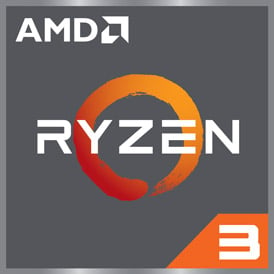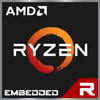
AMD Ryzen 3 5300G Benchmark, Test and specs
Last updated:
The AMD Ryzen 3 5300G was released in Q2/2021 and has 4 cores. The processor can process 8 threads simultaneously and uses a mainboard with the socket AM4 (PGA 1331). In the Geekbench 5 benchmark, the AMD Ryzen 3 5300G achieved a result of 1,380 points (single-core) or 5,425 points (multi-core).

| Name: | AMD Ryzen 3 5300G |
|---|---|
| Family: | AMD Ryzen 3 (33) |
| CPU group: | AMD Ryzen 5000G (16) |
| Architecture: | Cezanne (Zen 3) |
| Segment: | Desktop / Server |
| Generation: | 4 |
| Predecessor: | AMD Ryzen 3 4300G |
| Successor: | -- |
CPU Cores and Base Frequency
The AMD Ryzen 3 5300G has 4 cores. The clock frequency of the AMD Ryzen 3 5300G is 4.00 GHz (4.20 GHz). An initial performance assessment can be made using the number of CPU cores.
| CPU Cores / Threads: | 4 / 8 |
|---|---|
| Core architecture: | normal |
| Cores: | 4x Zen 3 |
| Hyperthreading / SMT: | Yes |
|---|---|
| Overclocking: | Yes |
| Frequency: | 4.00 GHz |
| Turbo Frequency (1 Core): | 4.20 GHz |
| Turbo Frequency (4 Cores): | 4.20 GHz |
Internal Graphics
The AMD Ryzen 3 5300G has an integrated graphics that the system can use to efficiently play back videos. The AMD Ryzen 3 5300G has the AMD Radeon RX Vega 6 (Renoir) installed, which has 6 streaming multiprocessors (384 shaders).
| GPU name: | AMD Radeon RX Vega 6 (Renoir) |
|---|---|
| GPU frequency: | 0.40 GHz |
| GPU (Turbo): | 1.70 GHz |
| Compute units: | 6 |
| Shader: | 384 |
| Hardware Raytracing: | No |
| Release date: | Q1/2020 |
| Max. displays: | 3 |
|---|---|
| Generation: | 9 |
| Direct X: | 12 |
| Technology: | 7 nm |
| Max. GPU Memory: | 2 GB |
| Frame Generation: | No |
Hardware codec support
Processors with integrated graphics can process video codecs faster. Support for modern codecs can significantly increase system efficiency during video playback.
| h265 / HEVC (8 bit): | Decode / Encode |
|---|---|
| h265 / HEVC (10 bit): | Decode / Encode |
| h264: | Decode / Encode |
| VP8: | Decode / Encode |
| VP9: | Decode / Encode |
| AV1: | No |
|---|---|
| AVC: | Decode / Encode |
| VC-1: | Decode |
| JPEG: | Decode / Encode |
Memory & PCIeThe AMD Ryzen 3 5300G supports a maximum of 64 GB memory. Depending on the mainboard, the processor can use a maximum of 2 (Dual Channel) memory channels. This results in a maximum bandwidth of the main memory of 51.2 GB/s. |
|
| Memory type: | Memory bandwidth: |
|---|---|
| DDR4-3200 | 51.2 GB/s |
| Max. Memory: | 64 GB |
| Memory channels: | 2 (Dual Channel) |
| ECC: | No |
| PCIe: | 3.0 x 20 |
| PCIe Bandwidth: | 19.7 GB/s |
Thermal ManagementThe AMD Ryzen 3 5300G has a TDP of 65 W. Based on the TDP, the system manufacturer can and must adapt the cooling solution to the processor. |
|
|---|---|
| TDP (PL1 / PBP): | 65 W |
| TDP (PL2): | -- |
| TDP up: | -- |
| TDP down: | -- |
| Tjunction max.: | 95 °C |
Technical details
Modern production reduces the waste heat of a processor and increases its efficiency. The AMD Ryzen 3 5300G is made in 7 nm and has 10.00 MB cache.
| Technology: | 7 nm |
|---|---|
| Chip design: | Monolithic |
| Socket: | AM4 (PGA 1331) |
| L2-Cache: | 2.00 MB |
| L3-Cache: | 8.00 MB |
| AES-NI: | Yes |
| Operating systems: | Windows 10, Windows 11, Linux |
| Virtualization: | AMD-V, SVM |
|---|---|
| Instruction set (ISA): | x86-64 (64 bit) |
| ISA extensions: | SSE4a, SSE4.1, SSE4.2, AVX2, FMA3 |
| Release date: | Q2/2021 |
| Release price: | -- |
| Part Number: | -- |
| Documents: | Technical data sheet |
Rate this processor
Benchmark results

The benchmark results for the AMD Ryzen 3 5300G have been carefully checked by us. We only publish benchmark results that have been created by us or that have been submitted by a visitor and then checked by a team member. All results are based on and fullfill our benchmark guidelines.
Geekbench 5, 64bit (Single-Core)
Geekbench 5 is a cross plattform benchmark that heavily uses the systems memory. A fast memory will push the result a lot. The single-core test only uses one CPU core, the amount of cores or hyperthreading ability doesn't count.

|
AMD EPYC 7313P
16C 32T @ 3.70 GHz |
||

|
AMD EPYC 7573X
32C 64T @ 3.60 GHz |
||

|
Intel Core i5-11300H
4C 8T @ 4.40 GHz |
||
|
|
AMD Ryzen 3 5300G
4C 8T @ 4.20 GHz |
||

|
MediaTek Dimensity 9000+
8C 8T @ 3.20 GHz |
||

|
AMD Ryzen 3 PRO 5350G
4C 8T @ 4.20 GHz |
||

|
Intel Core i7-8086K
6C 12T @ 5.00 GHz |
||
Geekbench 5, 64bit (Multi-Core)
Geekbench 5 is a cross plattform benchmark that heavily uses the systems memory. A fast memory will push the result a lot. The multi-core test involves all CPU cores and taks a big advantage of hyperthreading.

|
Intel Core i7-9700T
8C 8T @ 3.20 GHz |
||

|
Intel Core i7-9850HE
6C 12T @ 2.70 GHz |
||

|
AMD Ryzen 5 5600U
6C 12T @ 3.60 GHz |
||
|
|
AMD Ryzen 3 5300G
4C 8T @ 4.20 GHz |
||

|
AMD Ryzen 3 PRO 5350G
4C 8T @ 4.20 GHz |
||

|
Intel Xeon D-1541
8C 16T @ 2.10 GHz |
||

|
AMD Ryzen 5 2600
6C 12T @ 3.70 GHz |
||
Geekbench 6 (Single-Core)
Geekbench 6 is a benchmark for modern computers, notebooks and smartphones. What is new is an optimized utilization of newer CPU architectures, e.g. based on the big.LITTLE concept and combining CPU cores of different sizes. The single-core benchmark only evaluates the performance of the fastest CPU core, the number of CPU cores in a processor is irrelevant here.

|
Intel Core i9-10900K
10C 20T @ 5.30 GHz |
||

|
AMD Ryzen 7 3800X
8C 16T @ 4.50 GHz |
||

|
Intel Xeon E-2278G
8C 16T @ 5.00 GHz |
||
|
|
AMD Ryzen 3 5300G
4C 8T @ 4.20 GHz |
||

|
Intel Xeon W-1270P
8C 16T @ 5.10 GHz |
||

|
AMD Ryzen 3 PRO 5350G
4C 8T @ 4.20 GHz |
||

|
AMD EPYC 7313
16C 32T @ 3.70 GHz |
||
Geekbench 6 (Multi-Core)
Geekbench 6 is a benchmark for modern computers, notebooks and smartphones. What is new is an optimized utilization of newer CPU architectures, e.g. based on the big.LITTLE concept and combining CPU cores of different sizes. The multi-core benchmark evaluates the performance of all of the processor's CPU cores. Virtual thread improvements such as AMD SMT or Intel's Hyper-Threading have a positive impact on the benchmark result.

|
Intel Xeon E5-2690 v2
10C 20T @ 3.30 GHz |
||

|
Intel Core i3-N305
8C 8T @ 3.20 GHz |
||

|
Intel Core i5-1145GRE
4C 8T @ 2.80 GHz |
||
|
|
AMD Ryzen 3 5300G
4C 8T @ 4.20 GHz |
||

|
AMD Ryzen 3 PRO 5350G
4C 8T @ 4.20 GHz |
||

|
Intel Core i7-1160G7
4C 8T @ 3.60 GHz |
||

|
Intel Core i3-10105F
4C 8T @ 4.20 GHz |
||
iGPU - FP32 Performance (Single-precision GFLOPS)
The theoretical computing performance of the internal graphics unit of the processor with simple accuracy (32 bit) in GFLOPS. GFLOPS indicates how many billion floating point operations the iGPU can perform per second.

|
AMD Ryzen Embedded R2544
AMD Radeon RX Vega 8 (Raven Ridge) @ 1.30 GHz |
||

|
Intel Core i5-6685R
Intel Iris Pro Graphics 580 @ 1.15 GHz |
||

|
Intel Core i7-6785R
Intel Iris Pro Graphics 580 @ 1.15 GHz |
||
|
|
AMD Ryzen 3 5300G
AMD Radeon RX Vega 6 (Renoir) @ 1.70 GHz |
||

|
AMD Ryzen 3 5300GE
AMD Radeon RX Vega 6 (Renoir) @ 1.70 GHz |
||

|
AMD Ryzen 3 4300G
AMD Radeon RX Vega 6 (Renoir) @ 1.70 GHz |
||

|
AMD Ryzen 3 PRO 4350GE
AMD Radeon RX Vega 6 (Renoir) @ 1.70 GHz |
||
Estimated results for PassMark CPU Mark
Some of the CPUs listed below have been benchmarked by CPU-monkey. However the majority of CPUs have not been tested and the results have been estimated by a CPU-monkey’s secret proprietary formula. As such they do not accurately reflect the actual Passmark CPU mark values and are not endorsed by PassMark Software Pty Ltd.

|
Intel Xeon W-1250
6C 12T @ 4.20 GHz |
||

|
Intel Core i5-1235U
10C 12T @ 2.50 GHz |
||

|
Intel Core i3-12300T
4C 8T @ 3.20 GHz |
||
|
|
AMD Ryzen 3 5300G
4C 8T @ 4.20 GHz |
||

|
AMD Ryzen 3 PRO 5350G
4C 8T @ 4.20 GHz |
||

|
Intel Xeon Gold 6128
6C 12T @ 3.50 GHz |
||

|
Intel Xeon E-2286G
6C 6T @ 4.40 GHz |
||
Benchmarks

Geekbench 5 (SC)
2,488 entries
2,488 entries

Geekbench 5 (MC)
2,461 entries
2,461 entries

Geekbench 6 (SC)
1,754 entries
1,754 entries

Geekbench 6 (MC)
1,702 entries
1,702 entries

FP32 SP (iGPU)
2,026 entries
2,026 entries

PassMark CPU-Mark
2,391 entries
2,391 entries
Description of the processor
The AMD Ryzen 3 5300G is a 4-core desktop processor with an integrated graphics unit (iGPU). The processor clocks its CPU cores with 3.8 GHz. It can boost this clock rate to 4.2 GHz, with one or more CPU cores running at this clock. The AMD Ryzen 3 5300G is based on AMDs Zen 3 CPU cores, which are also used in the new AMD Ryzen desktop processors without iGPU. The AMD Ryzen 3 5300G now uses a mixture of the Zen 3 cores of an iGPU with the "Cezanne" architecture.It supports simultaneous multi-threading and can process 2 threads per CPU core, so a total of 8. It is overclockable via the AMD Ryzen Master Tool (CPU and GPU), but this also requires a motherboard chipset that supports overclocking. The processor fits into the socket AM4, but many older motherboards require a bios update (with an older AM4 processor) before.
The AMD Radeon 6 Graphics (Renoir) with 6 execution units and 384 shaders is used as the iGPU in the AMD Ryzen 3 5300G. It is the smallest expansion stage of the Renoir APUs, which is based on AMDs 1st RDNA generation. Unfortunately, the GPU cannot decode the new AV1 codec in hardware yet.
The AMD Ryzen 3 5300G supports 64 GB of DDR4-3200 RAM in two memory channels (dual-channel). In contrast to the normal Ryzen 5xxx desktop processors, the Ryzen 5xxxG APUs do not yet support PCIe 4.0 and can therefore only connect devices via a PCIe 3.0 interface with a maximum of 12 lines.
The processor is classified in the TDP class of 65 watts, but it can use much less energy in reality due to the low core count and clock frequency. The level 3 cache is 16 MB. The processor is manufactured in 7 nm and is correspondingly energy-efficient.
Popular comparisons
back to index





